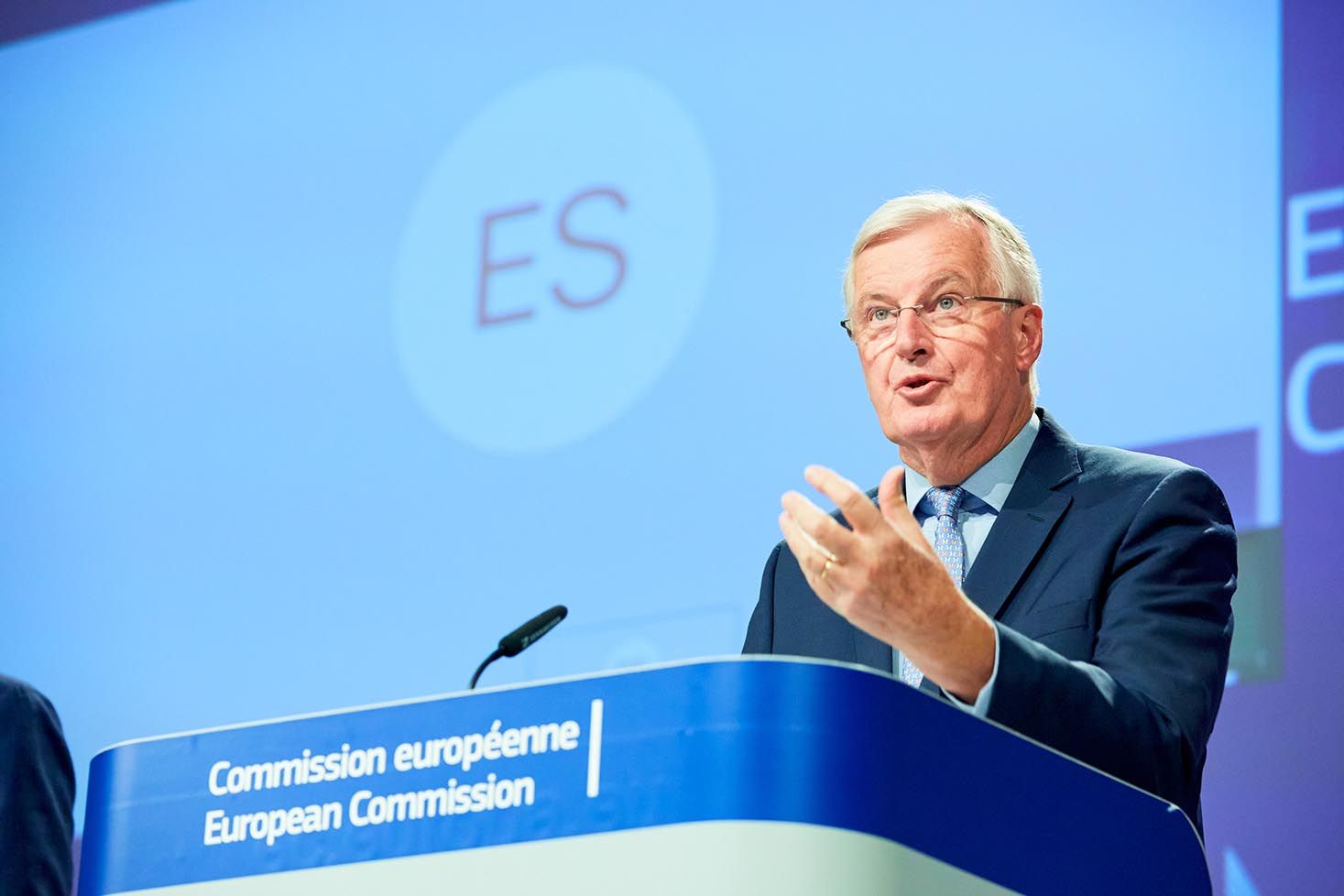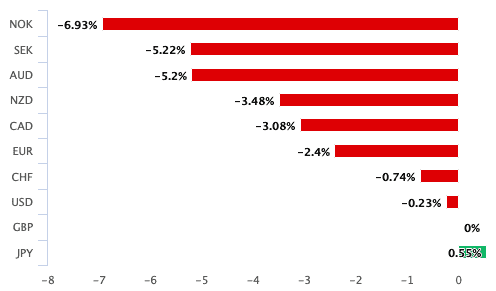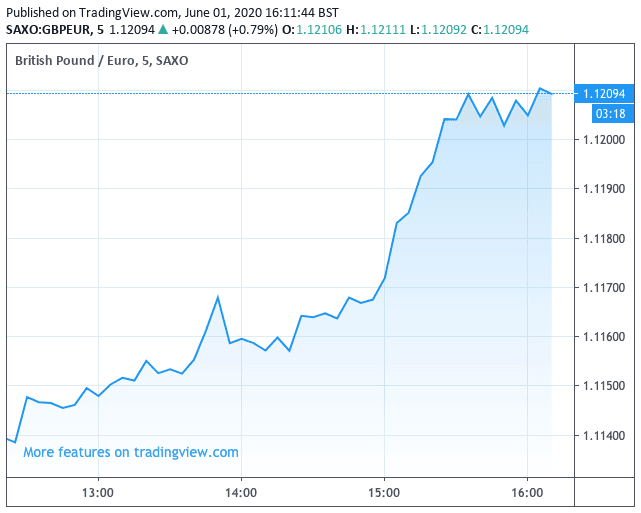Pound Sterling Jumps 1.0% against Euro and Dollar at Start of New Week but Forecasters Warn of Downside as Brexit Heat Rises
- Benign market conditions prompt GBP recovery
- But GBP could underperform this week on Brexit talks outcome
- Potential for Brexit talks breakthrough this week are slim

Above: Michel Barnier updating media on state of EU-UK trade negotiations. Photographer: Claudio Centonze. © European Union, 2020. Source: EC - Audiovisual Service
- GBP/EUR spot: 1.1211 | GBP/USD spot: 1.2471
- GBP/EUR bank rates: 1.0990 | GBP/USD bank rates: 1.2222
- GBP/EUR specialist rates: 1.1110 | GBP/USD specialist rates: 1.2360
- Find out more about the above
The British Pound surged into a new week and month against the Euro and U.S. Dollar, driven by a rally in global equity prices amidst steadily improving investor sentiment regarding the world's exit from lockdown and shifts in market positioning ahead of this week's crucial Brexit trade negotiations.
Traders entered this week relatively bearish on Sterling's prospects on a view the trade negotiations are unlikely to yield any material progress, courtesy of the dour communications from both EU and UK camps over recent weeks.
Erik Bregar, Head of Strategy at Exchange Bank of Canada says Sterling is "on fire", amidst potential "pre-positioning for some positive Brexit headlines this week".
We would however imagine that with markets expecting a close to 0% prospect of a breakthrough between the EU and UK this week Sterling has eaten its full share of negativity surrounding the matter. Indeed, if this week reveals even the slightest hint the two sides could strike a deal in the future there could be some decent recovery potential to be had in Sterling.
Make no mistake though, much of Sterling's upside does owe itself to a supportive market environment. While Sterling starts the new week higher against the Dollar, Euro and Japanese Yen but is seen to be softer against the 'risk on' Australian Dollar, New Zealand Dollar and Norway's Krone.
'Risk on' currencies are outperforming their peers owing to a broadly firmer sentiment across global equity markets, with Asian stocks closing higher for the most part and European markets looking set to follow.
"The impact of ongoing US-China geopolitical tensions on market sentiment, especially in relation to the latter’s new security law in Hong Kong, will continue to spar with global recovery optimism as economies reopen. However, US President Trump stopping short of announcing specific new sanctions over China on Friday, has left markets optimistic that the ‘phase one’ trade deal between the two may not be abandoned," says Nikesh Sawjani, Economist at Lloyds Bank. "This has provided a supportive backdrop to markets... with all the major equity indices across the Asia-Pacific region registering strong gains."
With broader sentiment appearing to be in charge of market moves we are not surprised to see Sterling looking supported against the Dollar and Euro, as the UK currency tends to outperform these two peers when markets are rising and there is little on the domestic agenda to bother markets.
The benign market backdrop has allowed the Pound-to-Euro exchange rate to trade a percent higher at 1.1207 while the Pound-to-Dollar exchange rate also quoted a percent higher at 1.2463. "Sterling bulls now have the upper hand technically," says Bregar.
A Big Week
Sterling's advance is however unlikely to persist over coming days given that we are entering another important week on the Brexit front and we expect negative headlines concerning the state of trade negotiations to weigh.
Brexit has been increasingly relevant to Sterling over recent weeks, and this might explain the currency's underperformance of late: over the course of the past month the Pound has fallen against all its G10 peers apart from the Japanese Yen which has been penalised by the ongoing global stock market recovery.

Above: GBP's relative performance against G10 rivals over the course of the past month
This suggests markets are increasingly nervous of a 'no deal' outcome to trade negotiations, given that both sides appear to be far apart on a number of key issues.
Joseph Capurso, Strategist at Commonwealth Bank of Australia says he expects Thursday's European Central Bank meeting and the final round of Brexit trade negotiations to be catalysts for a weaker Pound-Euro exchange rate this week
"We doubt the UK and the EU will make significant progress during this week’s final round of Brexit talks. Disagreement remains on regulatory alignment and access by UK financial services firms to the EU," says Capurso.
The EU maintain that for the UK to secure a trade deal with the EU it must agree not to out-compete its neighbours (the so-called level playing field provisions), allow EU fishing fleets unfettered access to UK waters and accept a continuing role for the European Court of Justice.
The UK argues that the EU has already agreed trade deals with other nations, such as Canada, similar to that which they seek. However, Canada and other nations do not have to agree to the caveats the EU demand of the UK.
"As to our demands being unreasonable, these are our demands. No qualification UK can put to them will change our demands. We need to find space for compromise loyal to mandate of EU - that’s the challenge that lies ahead of us," said Stefaan de Rynck - advisor to EU Chief Negotiator Michel Barnier - on Friday told an Institute for Government event.
De Rynck concedes the EU is "asking for a lot on state aid [dynamic alignment] because Member States and EU industry are very concerned", adding: "we need to find ways forward on the regulatory approach, also on state aid issues, otherwise we will not be able to conclude a deal."
Members of the EU negotiating team have said repeatedly they remain open to the UK extending its current transition period in order to buy time to negotiate further, however London has repeatedly rejected this.
However, with Prime Minister Boris Johnson holding a sizeable majority it appears that the UK will be able to fulfil a promise that the government will not delay attaining a 'full' Brexit by end-2020, thereby putting some pressure back onto the EU side.
While it is likely a compromise will be sort it will only likely come at the last minute, and therefore we may have to wait until December for any final deal to be struck.
Until then, the game play between both sides should keep ample anxieties alive for Sterling to under-perform its peers.
"The British Pound rallies when the UK moves toward deeper integration with Europe, and falls when the UK moves towards a no-deal Brexit decision," says Erik Norland, Executive Director and Senior Economist of CME Group. "Going into this next round of negotiations, GBP options markets are more skewed to the downside than usual with out-of-the-money (OTM) put options substantially more expensive than usual compared to OTM calls."
Sterling has become increasingly responsive to news flow concerning the state of negotiations and we therefore expect to see some volatility over coming days and weeks as a result, with all signs suggesting any sizeable moves are liable to be towards the downside.






